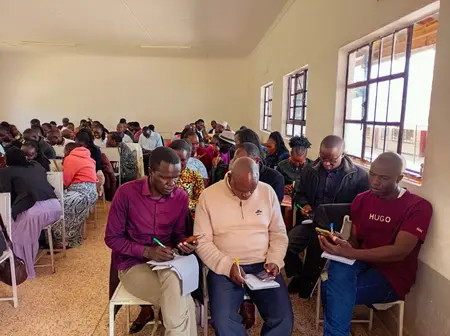West Pokot teachers during the past retooling/ Photo file
The West Pokot Siyoi Zone Curriculum Support Officer (CSO) has urged the teachers to embrace learner-centered and go beyond the traditional memorization style of learning.
Speaking during a recent education stakeholders’ forum, Meli Matonyei, commended educators for their resilience and adaptability during a time of national educational transformation.
He encouraged them to shift from traditional instruction to the learner-centered approach that defines the Competency-Based Curriculum (CBC). The shift, he noted, is not merely about changing what is taught, but about transforming how learning happens.
“You are no longer just instructors,” he told the audience. “You are mentors, role models, and facilitators of growth. Our students no longer need to be told what to think—they need to be taught how to think, how to ask, how to create, and how to grow.”
“This transition to facilitative teaching is one of the foundational pillars of CBC, Kenya’s most comprehensive curriculum reform since independence. The curriculum aims to nurture learners holistically—academically, socially, emotionally, and morally—while equipping them with competencies for the 21st-century world.” He said
As the CBC continues to advance into Senior School, Matonyei confirmed that all senior schools in Siyoi Zone are expected to implement at least two to three career pathways beginning next academic year. These include the STEM pathway, Creative Arts and Sports, and the Social Sciences, giving learners an opportunity to specialize based on their talents, interests, and aspirations.
He emphasized that this change requires schools not only to invest in infrastructure and teacher capacity but to embrace a deeper cultural shift that redefines the purpose of education.
“This is not just a curriculum change. It’s a mindset shift,” he said. “Our schools must be ready—not just physically with laboratories and materials, but intellectually and morally, with a commitment to serving the learner’s future.”
On assessment practices, Matonyei urged teachers to go beyond recording scores and conduct detailed, question-by-question analysis of examination results. He noted that CBC demands a more formative and diagnostic approach, where each learner’s strengths and gaps are identified and addressed in real time.
“Every question answered incorrectly is not a failure, but a signal—a message from the learner asking for help,” he explained. “Let us respond to these signals with compassion and precision.”
Matonyei further cautioned that career choices should reflect the learner’s potential, not merely societal preferences.
“Do not bow to pressure,” he said firmly. “Guide the learners honestly. Help them discover who they are, not who others want them to be. Dignity is not found in the title of a profession, but in doing what you were meant to do, and doing it with excellence.”

Leave a Reply